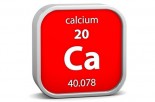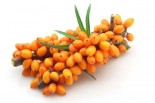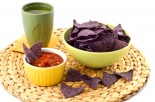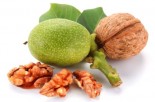Search Podcasts
Aronia: The Berry You Need to Know About
Tuesday, 25 October 2016You won’t find this berry in your parfait, and you may have never even heard of it.
The berry you need to know about is from the Aronia family of shrubs, which are native to North America.
The best-known fruit of aronia are Aronia melanocarpa and Aronia prunifolia, known as black chokeberries due to their astringency. Their dark pigmentation is the result of an abundance of polyphenols that include flavonoids, anthocyanins, and proanthocyanins, which are potent antioxidants. Among berries, aronia is particularly high in these factors.
Compared to elderberry, seven varieties of black and red currant, and six varieties of gooseberries, aronia has been shown in research to contain the highest total anthocyanin concentration and antioxidant capacity!
How to Increase Female Sex Drive
Tuesday, 23 September 2014
When do women reach their sexual peak?
Is it at 30, 40 or maybe even 50 years old? Well, if we use conventional medical opinion, then women are past their sexual peak when they hit menopause, which is characterized by ovarian shutdown.
So what do you think? Is a woman’s sexuality linked only to functioning ovaries?
I think the answer is no.
A woman’s sexuality is not linked to her ovaries. I believe that women and men can have active sex lives well into advanced age. Why else would we have a “blue” sex pill for men? But here’s the million-dollar question: Where’s the “blue” sex pill for women?
Don't Stop Taking Calcium Supplements
Thursday, 12 June 2014In 2010, a study published in British Medical Journal concluded that women taking calcium supplements significantly increased their risk of heart disease — by as much as 27%.
The authors’ conclusions were picked up by mainstream media and sensational headlines blanketed the airways and print media. The negative headlines made their impact as they fearfully convinced women to stop taking their calcium supplements.
What a mistake.
Fighting Against Seasonal Allergies
Tuesday, 25 March 2014Now that it's sniffle and sneeze season, people are already looking for relief. Black cumin seed oil contains a known immune modulator that could potentially help millions of people dry up their sinuses.
Now, we're not talking about the spice cumin - that's a totally different plant species from black cumin. This is something else entirely.
So, although I would always advise to cook liberally with cumin, it probably won't help your runny, itchy nose. Sorry.
But black cumin, however, may very well help because it provides thymoquinone - an immune modulator. Let's explore how it works.
Omega-7 Fatty Acids Decrease Hunger
Wednesday, 26 February 2014The Sea Buckthorn plant has an unusual concentration of the essential omega-7 fatty acid. Some nutritionists even believe it's the best source of Omega-7 fat that exists.
But why is this important to you?
Well, for starters, omega-7 helps your body maintain itself in a variety of ways, including counteracting weight gain. The discovery of this fact has obviously produced a great amount of interest among medical researchers, and initial surprising research has many predicting that omega-7 may ultimately become a powerful tool in the weight loss battle.
Below, we'll explore the details.
Can Hypothermia Save Lives?
Wednesday, 29 January 2014Did you know that ice can potentially save your life?
If you're having a heart attack, it could.
Scientists are discovering how cooling the human body down several degrees can actually save lives. This isn't the stuff of science fiction, but the result of many years of research.
If you find this interesting, read on to find out how hypothermia is making a difference in the medical field. Who knows, it may actually save your life one day.
Health Benefits of Donating Blood
Sunday, 15 December 2013Donating blood has many health benefits. Not only will you help someone in need of blood, but you will also help optimize your health and wellness. Here are the top three health benefits from donating blood.
Protect Your Heart by Reducing Oxidative Stress
Iron in your blood can oxidize resulting in damage to your cells and tissues. The increase in oxidative stress is most dangerous to your cardiovascular system. According to a new study published by the American Medical Association, giving blood every six months led to fewer heart attacks and strokes in test participants ages 43 to 61.
Excessive iron is thought to contribute to heart disease, especially at its early stages. Donating blood on a regular basis reduces the iron stores in the body and this study supports the theory that reducing iron appears to preserve cardiovascular health.
A second study of 2,682 men in Finland, reported in the American Journal of Epidemiology, found that men who donated blood at least once a year had an 88 percent lower risk of heart attacks than non-donors. This same group of researchers published a follow-up study and found that men who donated blood were less likely than non-donors to show any signs of cardiovascular disease.1
This is Your Brain on Onions
Thursday, 07 November 2013In cooking, onions are one of the components of mirepoix (pronounced meer-pwah) - a French culinary term for a finely chopped mix of onion, celery, and carrots. It's used as a flavor base for a wide variety of dishes.
I know this, not because I cook, but because I love watching the Food Channel. I don't know why, but watching other people cook simply fascinates me.
I digress ... back to onions.
Anyway, new research shows that onions are good for mice brains and probably ours as well. Eating them or supplementing with an onion extract may help to lower MDA or malondialdehyde, a marker of oxidative stress and a brain cell killer.
Warning: Another Deadly Chemical in Our Food Supply
Sunday, 06 October 2013Just look at Mountain Dew, for example. The hazy appearance within its very unnatural fluorescent color comes from BVO.
Patented by chemical companies as a flame retardant, and banned in food throughout Europe and Japan, BVO has been added to soft drinks for decades in North America. Now, some scientists have a renewed interest in this little-known ingredient.
How to Treat Constipation Safely
Thursday, 19 September 2013Occasional constipation is usually not a big deal. For most of us, with better hydration, it resolves itself without much of a hassle.
However, chronic bouts of constipation are not only uncomfortable, but also can inflame your colon's mucosal lining. This inflammation can cause bowel motility problems in the future.
The problem with chronic constipation is that no one really knows how to define it or treat it. The conventional approach usually involves bowel stimulants which can be unpredictable and ineffective.
Not only that, but who wants to have to rely on bowel stimulants for long periods of time? They're just not a good option for effective relief.
Is Processed Fructose a Poison?
Monday, 02 September 2013What is a poison? Well, interestingly, there are different theories as to what makes something a poison. But most of them go something like this:
"A dangerous chemical, natural or unnatural, enters the blood through the skin, gut or lungs and travels to the liver, the primary organ of detoxification."
The liver attempts to "detoxify" the chemical creating metabolites — sometimes the metabolites are less toxic and sometimes they're not — in order to excrete the chemical and any remnants of it out of the body.
So for us to believe that fructose is a poison, it needs to follow, in some respects, the pathway I just described — and I'll get to that soon.
But first, let's clarify something...
Is Blue Corn Healthy?
Sunday, 11 August 2013Anthocyanins are a type of plant-based antioxidant found in abundance but not exclusively in berries. Take, for instance, blue corn, which is regular yellow corn that has a high level of anthocyanins. The anthocyanins are actually what give it a bluish hue.
Fortunately, anthocyanins are good for you from any source, including corn. Just take a look at this short list of benefits that are commonly attributed to anthocyanins:
Enhance glucose metabolism and reduce glucose absorption
Induce cancer apoptosis (programmed cell death) in several cancer cell lines.
Metabolize toxins and inhibit DNA damage.
Inhibit inflammatory gene expression and reduce inflammation.
Reduce capillary permeability and fragility and boost nitric oxide.
Metabolize carcinogens.
So this is why I am interested in both blue corn and anthocyanins. See where I am headed now?
Warning: Chronic Inflammation Can Damage Your Heart & Health
Wednesday, 31 July 2013Inflammation is the way your body responds to a problem. Whether battling an infection or cancer, or healing from a bone fracture, your body needs to deliver powerful immune and repair cells to the impaired location through your bloodstream in order to fight and fix the problem.
Inflammation is really designed to be an acute process that gets in and out quickly. The longer the immune and repair cells stay in a location, the greater the chance they'll actually cause damage to surrounding healthy cells and tissues.
Chronic inflammation, simply put, is acute inflammation that did not resolve properly. The result is damage and disease. This is why we call chronic inflammation the common denominator of all age-related disorders.
The 250:250 Weight Loss Rule
Monday, 01 July 2013I did a search on Google for weight loss, weight loss supplements and weight loss nutrients. You can only imagine how many web pages and products Google found. We’re talking millions of web pages and thousands of product pages. No kidding.
But here are my questions. Have we overly complicated weight loss and do we really need thousands of “miracle” fat burners? Well, I think we have complicated it too much and I don’t think we need thousands of products. Let me explain.
Heart Disease Risk Factors Your Doctor Won't Tell You About
Monday, 17 June 2013Modifying traditional heart disease risk factors is not enough to protect your heart. Many Americans continue to suffer from heart attacks and stroke despite receiving a clean bill of health from their doctors. So what are we missing?
Traditional medicine modifies just 6 risk factors — obesity, smoking, high LDL-cholesterol, low HDL-cholesterol, high triglycerides, and high blood sugar. However, integrative and alternative doctors have come to recognize 11 additional risk factors.
Here are two additional risk factors to consider if you want to keep your heart healthy …
Red Cabbage is Good for Bad Nerves
Wednesday, 29 May 2013The latest discovery is found in almost every grocery store in the nation … red cabbage. Researchers at the United Arab Emirates University studied red cabbage extract’s protective action against oxidative stress. Their results are quite amazing.1
Diabetes was induced in male rats using a common laboratory technique (infusion of the chemical streptozotocin). Within 60 days, all of the rats infused with streptozotocin exhibited many symptoms of diabetes including loss of body weight, high blood sugar, kidney problems and nerve cell dysfunction.
The Health Benefits of Walnuts: A True 'Super Food'
Wednesday, 22 May 2013Walnuts are high in unsaturated, fatty acids, iron, and B vitamins. The oil in walnuts has a tendency to absorb strong odors, so they should be kept in cold storage. Manufacturers of syrup toppings, ice cream, candy, casseroles and baking products all rely on walnuts.
Although many nuts have proven to be really beneficial to your health, studies are showing that walnuts contain almost twice as many antioxidants as other nuts. And that’s not just an interesting statistic — all of those antioxidants really do your body a lot of good. Below, we’ll take a look at two big stand-out benefits of walnuts.














